Follow us on Telegram for the latest updates: https://t.me/mothershipsg
Among Singaporeans, the older generation is leading in sustainability awareness, adoption and advocacy compared to other age groups, the second OCBC Climate Index found.
The results from this year's OCBC Climate Index were revealed by the bank on Aug. 16 at a media briefing.
How the survey was conducted
Between Jun. 4 and Jun. 16, 2022, an online survey was carried out with Singaporeans aged 18 to 65.
There were a total of 2,169 respondents.
Respondents were asked questions related to awareness, adoption and advocacy of environmental issues and sustainability behaviours.
These are assessed based on four themes: transport, home, food and goods.
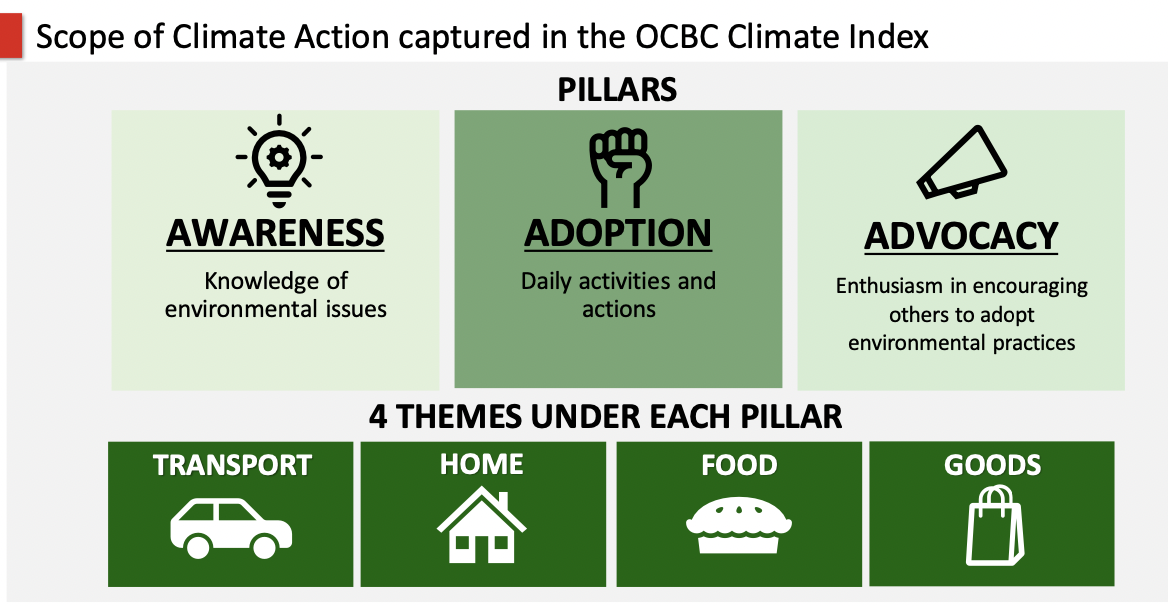 Image via OCBC.
Image via OCBC.
Responses were then converted into a numerical score from zero to 10, which were then used to derive a weighted average for each of the themes.
Transport was weighted at 45 per cent, home at 25 per cent, food at 15 per cent and goods at 15 per cent.
The resulting average for each theme was then added up to derive a score for each main pillars, which are subsequently used to calculate the national average index score.
Each main pillar was also weighted differently, with awareness and advocacy weighted at 20 per cent while adoption is weighted at 60 per cent.
No change in national average from 2021
The OCBC Climate Index was first launched in 2021.
Compared to last year's results, there was no change in the national average index score, which remained at 6.7 out of 10.
Specifically, Singaporeans averaged at 8.1 for "Awareness", 6.5 for "Adoption", and 5.6 for "Advocacy" this year.
This is nearly identical to the 2021 index, which had the same scores for "Adoption" and "Advocacy" but a marginally higher score of 8.3 for "Awareness".
This was "despite Covid-19, initiatives such as the SG Green Plan, a rise in green activism, and increased conversations at the national and global level", OCBC shared.
Baby boomers are role models, Gen Z falling behind
Diving deeper into the results, the index grouped the scores according to four generational groups: "Gen Z" (aged 18-25), "Millennials" (26-41), "Gen X" (42-57) and "Baby boomers" (58-65).
Across the pillars of awareness, adoption and advocacy, respondents belonging to the Baby boomers were "leading the pack", said Jason Boh, vice-president of Marketing Insights at OCBC.
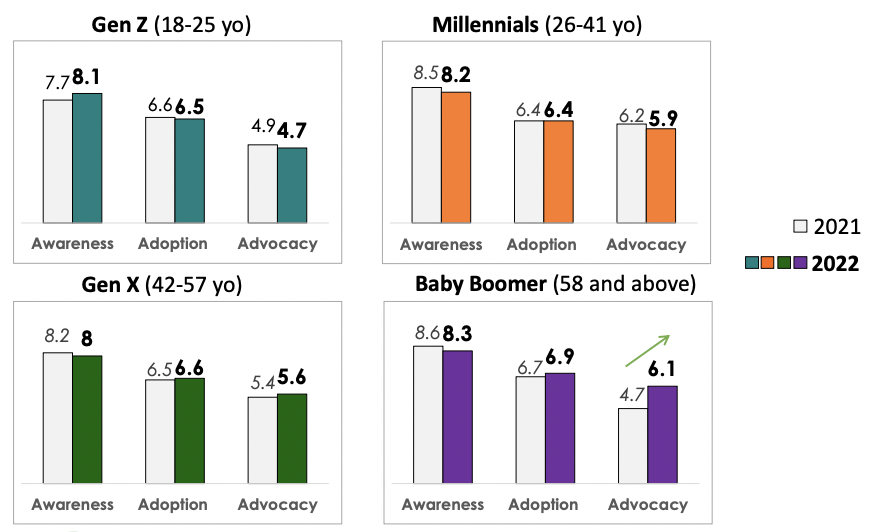 Image via OCBC.
Image via OCBC.
A focus group discussion as part of the survey discovered that the older generation became more confident in using technology over the Covid-19 pandemic.
As a result, more of them have read about environmental news and are sharing about the topic more frequently online.
The discussion also revealed enabling factors such as a complementarity between life stage and sustainability-related behaviours.
For example, the older might choose to walk or cycle to exercise and stay fit, rather than drive.
Boh also noted that they were more inclined than other age groups to practise sustainable lifestyle habits like using reusable containers when ordering takeaway.
Gen Z, on the other hand, had the lowest adoption and advocacy scores.
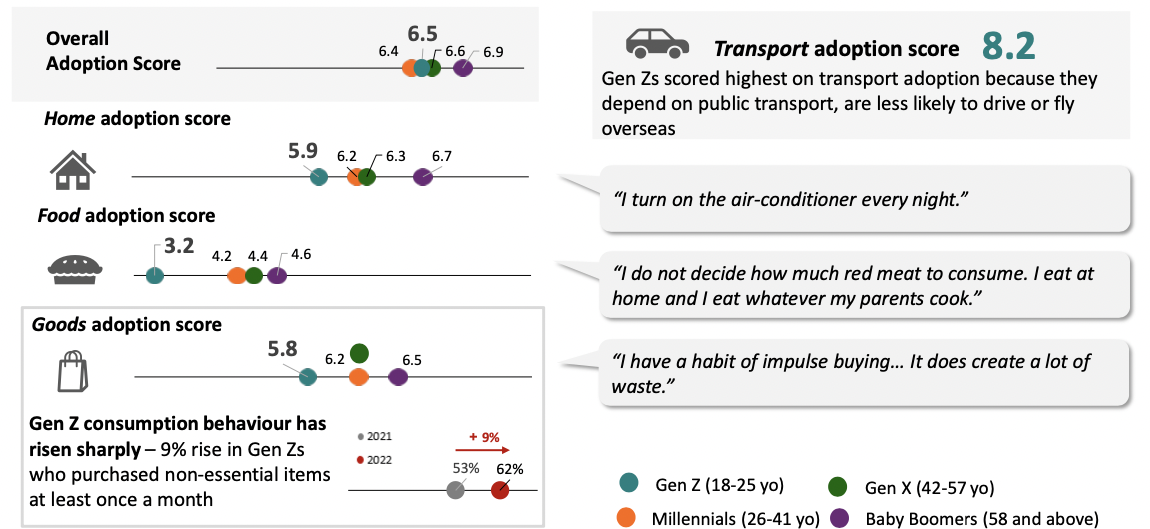 Image via OCBC.
Image via OCBC.
They fared the worst in adopting sustainable behaviours at home, with a score of 5.9, citing reasons such as an inability to decide their diet at home.
However, the survey found that they were the best-scoring when it came to adopting alternative transport.
In explaining this, Boh noted that it might be due to lower spending power among the younger respondents, which meant they did not own cars and are less likely to fly overseas.
Cost and inconvenience are main impediments
Boh also shared during the briefing that the survey results reveal Singaporeans to be "practical people".
When it came to barriers, the most often cited ones remained the same as the 2021 index – cost and inconvenience.
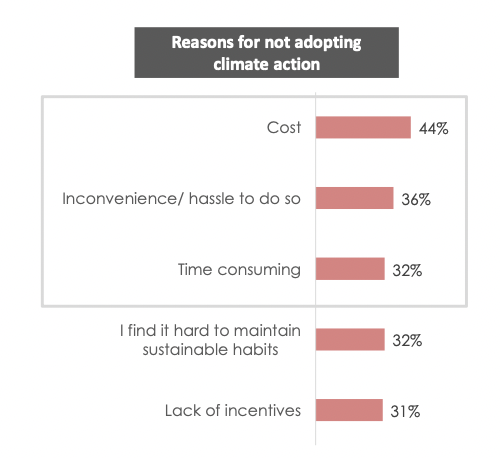 Image via OCBC.
Image via OCBC.
This was the case for recycling, where 58 per cent (Gen Z), 53 per cent (Gen X) and 57 per cent (Baby Boomers) cited inconvenience as the top barrier to recycling.
Boh noted that on the flip side, there were also reasons other than environmental ones for respondents to go green.
While 47 per cent of respondents cited the desire for a cleaner and greener environment as a motivation, just as many respondents cited better health as a motivation.
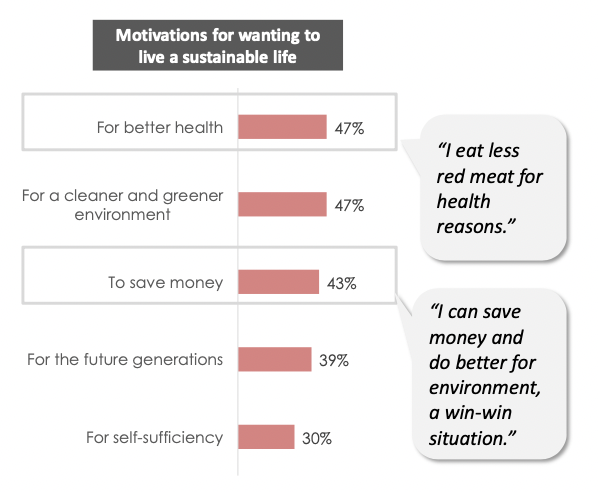 Image via OCBC.
Image via OCBC.
Such reasons are pushing Singaporeans to walk, cycle or take public transport, choose second-hand furniture instead of buying a new one, buy second-hand clothing, and participate in 'urban farming' initiatives.
In these areas, the survey indicated improvements.
For example, the proportion of respondents choosing to walk, cycle or take public transport has gone up from 71 per cent in 2021 to 78 per cent in 2022.
Increase in emission-heavy activities cancelled out gains
Nonetheless, these improvements were negated by increase in behaviours considered to be emissions-heavy activities.
For example, in the 2022 index, 55 per cent of respondents indicated that travelled by air, compared to 41 per cent in 2021.
21 per cent of respondents used air-conditions as the main mode of cooling at home, compared to 17 per cent in 2021.
In particular, the survey noted that 57 per cent of respondents were now buying a new, non-essential item each month, up from the previous 47 per cent in 2021.
Results can help to nudge behaviour, influence policy-making
In terms of interpreting the results, Boh shared that what they tried to do was "connect macro events" happening in the world to "what we are seeing in terms of people's behaviour".
For example, while no specific question on the cause was asked in the survey itself, the increase in non-essential household consumption may be linked to the re-opening post-pandemic within the past year.
Koh Ching Ching, Head of Group Brand and Communications at OCBC Bank, shared that this year's results show that more Singaporeans want to "create a more sustainable world", but they find it difficult to make real change "when it is expensive or not convenient".
Such insights from the 2022 OCBC Climate Index can be used to "nudge behaviour and influence policy-making", Koh noted.
Related article:
Top image via chuwasg/Wikimedia Commons
If you like what you read, follow us on Facebook, Instagram, Twitter and Telegram to get the latest updates.

